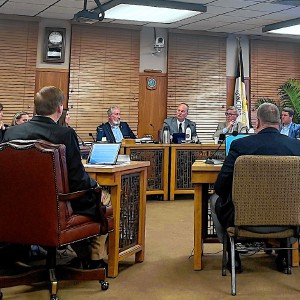Opinion: Which cannabis law, New Hampshire?

A variety of bud named Donnatello Kush is one of 15 displayed under magnifying glasses on the “bud bar” at Balagan Cannabis during the Northampton dispensary’s first day of business in 2021. File photo
| Published: 05-15-2024 4:22 PM |
James Riddle lives in Hillsborough.
With the Senate Judiciary Committee advancing a cannabis legalization bill for the first time in state history, the legislature and governor now have three choices.
First, cannabis legalization could be rejected by the House, Senate, or governor. If so, New Hampshire residents who want a little cannabis in their lives will continue to cross into neighboring states to purchase it, becoming criminals when they return home.
We will continue to lose both tax revenue and economic activity while criminalizing our citizens. I own a USDA-licensed hemp seed business, and attended cannabis expos in Augusta, ME, and Burlington, VT, last year. I expected to see booths for dispensaries and growers, which I did. I wasn’t prepared, however, for all of the support businesses — builders, bankers, bookkeepers, packaging, security, universities, insurance, tourism, greenhouses, inputs, HVAC, etc. And so many young entrepreneurs, young men and women excited about science and business! If legalization is rejected, we will continue to miss out on all that.
Second, Sen. Daryl Abbas’ amendment, which passed the Judiciary Committee, could become law. This would put the state directly in the cannabis business by establishing a cartel of 15 look-alike franchised cannabis chain stores, under a state-owned “New Hampshire Cannabis Retail Outlet” brand. The state would control prices, labels, the look and sale of the stores, and much more. As a franchiser, this would put the state directly under the authority of the Federal Trade Commission.
Sen. Abbas’ amendment would impose a 15% tax on all cannabis, including medical cannabis, while giving Liquor Commission administrators and employees a 10% pay raise, to take over the cannabis market. It would allow one individual to have three stores, meaning that five people from multi-state operations (MSO) could control the state’s entire cannabis market. It would cost more than $18 million over the first two years. This expensive, big government, Soviet-style model was not supported by the Cannabis Commission. It failed to gain traction in the House. And the idea is not supported by Granite State farmers.
Last fall, NHCANN, working with NOFA-NH, the NH Farm Bureau, and the NH Herbal Network, conducted a survey of NH farmers. 87 percent of respondents said cannabis should be legalized; 78 percent were interested in becoming licensed growers; but only 10.9 percent supported a state monopoly.
The third and best choice is HB 1633, which passed the House with overwhelming support. HB 1633 puts the state in firm control of the cannabis market, without putting the state in the cannabis business. Variations of this model, which support free enterprise, are working in 24 other states. HB 1633 establishes tough penalties for public smoking or vaping of cannabis, much tougher than for public consumption of alcohol or tobacco. Plus, it meets the governor’s criteria for limiting the number of stores to 15, no billboards, no marijuana miles, municipality opt-in, harm reduction, protection of children, no cannabis stores near schools, etc.
Article continues after...
Yesterday's Most Read Articles
 Merrimack Valley school board clashes with superintendent over process for budget cuts
Merrimack Valley school board clashes with superintendent over process for budget cuts
 Concord Shaw’s supermarket in Fort Eddy Plaza to close
Concord Shaw’s supermarket in Fort Eddy Plaza to close
 NH Senate passes parental bill of rights giving families more power to get answers about school records and programs
NH Senate passes parental bill of rights giving families more power to get answers about school records and programs
 Town Meeting election results for Merrimack County communities
Town Meeting election results for Merrimack County communities
 ‘It’s wonderful fun’: An exploration of winter and spring hiking in Concord
‘It’s wonderful fun’: An exploration of winter and spring hiking in Concord
 ‘That wasn’t the charge we were given’ – New city councilors question golf clubhouse options
‘That wasn’t the charge we were given’ – New city councilors question golf clubhouse options
Cannabis laws and regulations should maximize opportunities for Granite State farmers and businesses, minimize harm, and not be a sell out to multi-state cannabis operations. HB 1633 should be adopted and implemented.







 Opinion: What Trump really means by government efficiency
Opinion: What Trump really means by government efficiency Opinion: To salvage democracy, rebuild the Democratic Party
Opinion: To salvage democracy, rebuild the Democratic Party
